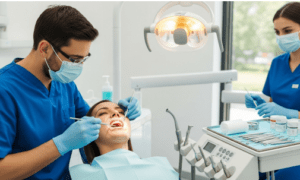Grinding teeth while sleeping may have long been out of the dentist’s purview because its most obvious effect is worn teeth. But for a decade, nocturnal grinding has been part of the International Classification of Sleep Disorders because this bruxism has a victim other than your teeth: your night rest. That’s why dentists highly recommend using night teeth guards to prevent teeth grinding while sleeping.
Still, many people who do not take good sleep as they should are unaware that the reason for their bad sleep, frequent awakening during the night, and waking up to a hurt jaw or teeth is this nocturnal bruxism.
This article will explain how teeth grinding can affect your rest and sleep quality and how a night guard for teeth grinding can help you alleviate the issue!
Link Between Teeth Grinding and Sleep Quality
Sleep or nocturnal bruxism consists of clenching the upper teeth against the lower ones in an uncontrolled way during sleeping that ends up producing muscle overload and consequences, especially in the teeth. Around 8% of the population is estimated to suffer from this disorder. Millions of Americans do not rest as they should because, although they do not know it, clenching and grinding of teeth wake them up 75 to 88% of the time it occurs.
These bruxism episodes at night are accompanied by brief awakenings lasting about 10 seconds that are not remembered the next morning but that the body does appreciate and reacts to by increasing heart, respiratory, and muscle rates. These micro-awakenings can occur up to 14 times per hour throughout the night and manage to disrupt sleep, making it difficult to get up rested the next morning.
Scientific Evidence on How Grinding Teeth Affects Your Sleep Quality
Several studies confirm that people with sleep bruxism have difficulty resting. One of them was carried out with bruxist and non-bruxist patients and confirmed that the former were three times more likely to suffer poor-quality sleep than the latter.
However, the hidden consequences of nocturnal bruxism do not consist only in fragmenting your rest. Teeth grinding has also been linked to major respiratory disorders like sleep apnea.
An Ambiguous Relationship-Teeth Grinding and Sleep Apnea
Evidence indicates that 90% of people with nocturnal bruxism also have some degree of sleep apnea. The problem with this relationship is that we don’t know if it was the chicken or the egg first: because you have bruxism apnea or if being a bruxist predisposes you to suffer apnea.
Many experts believe that it is apnea that favors the appearance of bruxism, but this has not been proven. But it is known that the two disorders are related, although their roles or how they interact with each other have not been discovered.
The relationship exists, and several hypotheses are being considered to explain it. The most interesting is also the most recent and maintains that the fact of suffering from apnea and bruxism at the same time does not have to be bad, even if the teeth suffer.
This hypothesis ensures that our brain, when it detects that we lack oxygen during sleep (which constitutes an episode of apnea,) sends an order to the temporal masseter muscles, which are the ones that close the mouth so that we clench our teeth. This causes the usual micro-awakening, and with it, we breathe again.
How to Prevent Teeth Grinding During Sleep?
If your dentist tells you need a splint because your teeth are worn, it’s time to get a second opinion. There are other conditions, such as suffering from reflux, diet, suffering from an eating disorder, and taking certain medications that also wear down the teeth.
You must investigate what is happening in the mouth because not all wear is due to bruxism. In addition, if there is an undiagnosed breathing problem during sleep and they put a normal splint on that patient, the condition can worsen. Therefore, you have to be careful.
The test to determine whether or not you suffer from sleep bruxism will not be found in the dentist’s office but in the hospital. It’s called polysomnography, and it’s done while you sleep. It records the activity of the chewing muscles (masseter and temporalis), that of the heart, the oxygen levels in the blood, and the respiratory rate, to which audio and video recordings are added to see the chewing activity during sleep.
Custom Made Night Guards for Reducing Teeth Grinding
Using a night guard for jaw clenching or teeth grinding has proven highly effective in reducing nocturnal bruxism. Among the varied reasons dentists recommend night teeth guards, sleep problem is the most common. Wearing one before bed gives a cushioning effect between the upper and lower teeth, preventing you from grinding them and causing harm.
Teeth grinding and jaw clenching also result in TMJ disorders, chipped teeth, and other issues. Therefore, your dentists may recommend a teeth grinding guard for any of these reasons.
Can Improving Sleep Apnea Improve Bruxism?
Though it’s not backed by some strong theory, but by putting a mandibular advancement device to improve sleep apnea, bruxism episodes also decrease. By increasing the upper airway, the frequency of bruxism episodes decreases. This makes us suspect that this serves the body to increase that airway.
Does this new hypothesis make bruxism an ally or an enemy? While the answer to this question is found, experts opt for a middle way to treat it. Traditionally it had been fought with all kinds of drugs (muscle relaxants, anticonvulsants, antidepressants, etc.). Now the treatment is oriented towards protecting the teeth and reducing the number of episodes per night so that there are fewer awakenings, but without eliminating them.
Thus, the current treatment of choice is using custom-made night guards that you must wear every time you go to bed. In addition to protecting the teeth, these night guards reduce movements related to nocturnal bruxism by 50%, which means half the chance of waking up.
Other devices that should be used for patients with sleep apnea but with limited effects on bruxism include the mandibular advancement devices: prostheses designed to advance the jaw that limits lateral movements while freeing the pharynx, reducing snoring and allowing greater air intake. This device also implies a greater night’s rest.
Do You Want the Best Custom Night Guard for Teeth Grinding?
Has your dentist recommended you a custom mouth guard for teeth grinding? Get one at clear custom night guard, a leading dental lab providing the best dentist-recommended night guards for years.
Visit our website to explore the product range of various night teeth guards, and choose the one that best suits your needs.
Call +1 (818) 857-2688 or visit the website to place your order!







































